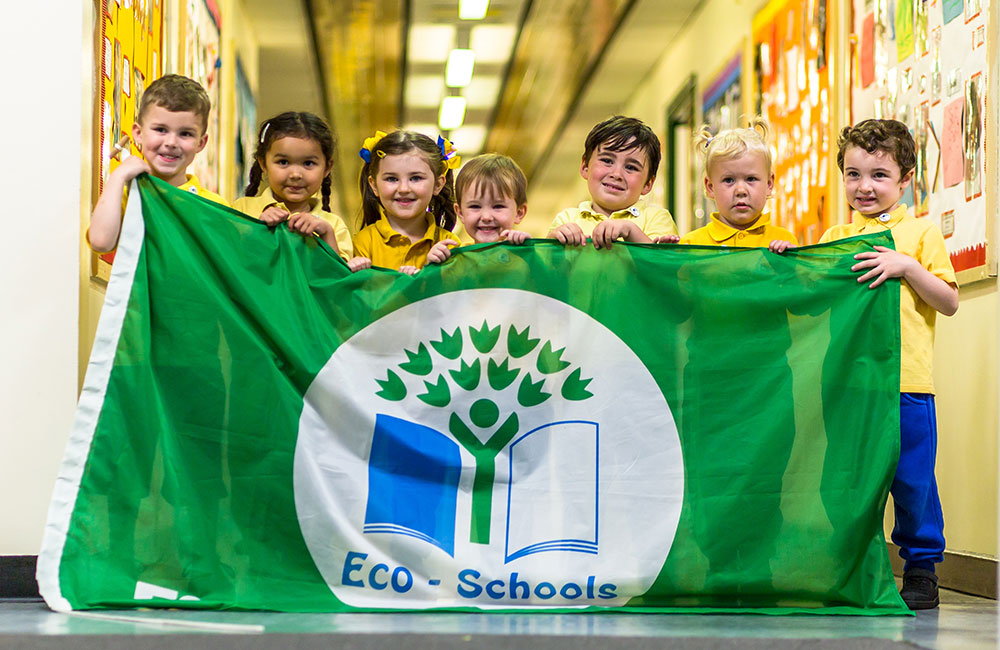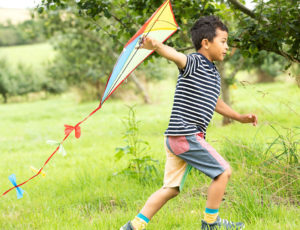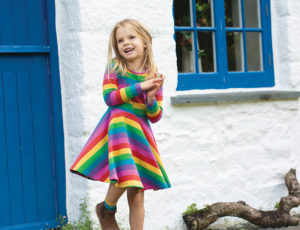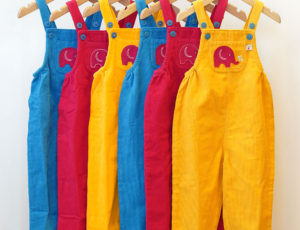
Ethical and organic children’s clothing company Frugi has confirmed a partnership with Eco-Schools as part of its Little Clothes BIG Change charity initiative.
Frugi’s ambition is ‘to help raise the next generation of eco-warriors to change the world’. The Eco-Schools programme, the largest educational programme in the world, is therefore the ideal partner.
The goal is to empower young people to take environmental actions to get their whole school and community involved. Schools follow a Seven Step programme that culminates in achieving an international Eco-Schools Green Flag certification.
Each year, Frugi donates 1% of turnover to charity. So far it has donated £720,000 over the past 16 years to help children and environmental non-profit organisations.
Frugi is committed to funding the Eco-Schools Green Flag fees for up to 150 UK schools; from Early Years Foundation (3-5), Primary Schools (5-11), through to Secondary and Further Education (12-18). It is the first company to sponsor schools for all age groups.
To kick off the partnership, Frugi is sponsoring a ‘10-day challenge’ as part of the hugely successful #EcoSchoolsAtHome campaign, which was launched during the Covid-19 lockdown.
Each day, Frugi and Eco-Schools will launch a new challenge around one of the Eco-Schools topics: Biodiversity, Energy, Global Citizenship, Healthy Living, Litter, Marine, School Grounds, Transport, Waste and Water.
The challenges are being supported by a raft of environmental influencers. These include household names such as Rowing Champion, Helen Glover; Robert Douglas from This Father Life; TV Presenter, Radzi Chinyanganya; and young cycling guru, Ruby Isaacs.
Frugi will also be running various competitions for pupils. For instance, to win organic T-shirt and sock bundles, water-bottles, back-packs, plus other ethically made items.
Commenting on the partnership is Hugo Adams, CEO of Frugi. “Benefiting children, communities and our environment, Eco-Schools shares the same goals, ambitions and ethos of Frugi.
“That’s why we are so proud and excited to be part of this collective global effort to support the education of children on sustainable and environmental issues and to help them to change our world for the better,”
National Eco-Schools manager, Lee Wray-Davies, adds; “No school in England has to be an Eco-School. Yet 20,100 Eco-Coordinators have given their valuable time (some for over 20 years) to manage and run the programme in their schools on top of the additional pressures and responsibilities they face within an ever-changing education sector.
“The maturity and determination of their students to make an environmental difference is a testimony to these inspiring individuals and the Eco-Schools programme.
“We are the largest educational programme on the planet. With the support of wonderful organisations such as Frugi helping us to create innovative projects and financially support schools, I don’t doubt we will continue to be for another generation.”
What is Eco-Schools?
Eco-Schools was introduced in 1994 in England as a response to the 1992 UN Rio Earth Summit. It now runs across 67 countries with more than 1,000 English schools proudly flying the internationally recognised Green Flag Award. It is operated globally by the Foundation for Environmental Education and is managed in England by Keep Britain Tidy.
Keep Britain Tidy is a charity and it is free to register on the Eco-Schools programme. Once registered, schools gain access to free Eco-Schools resources that help them meet the international Seven Step criteria.
A fee of £200 (+VAT) covers the cost of an assessor visit once the programme is complete and the Green Flag/certification schools received.
How Does It work?
Spanning 67 countries worldwide, the Eco-School’s programme gives pupils the freedom to decide one of 10 Eco-Schools topics they want to work on.
Once they have chosen the topics, they are free to decide what actions they want to take and how they are going to involve their school and community. The whole process takes around one academic year until they become a proud Green Flag owner and fully established Eco-School.
The Eco-Schools programme consists of three structural elements. This includes the Seven Step Framework, the Eco-Schools Topics, and assessment for the international Green Flag award.
To be successful, the programme requires support from school leaders and active involvement from staff. Plus, a long-term commitment and the willingness to involve students in decision-making. The Eco-Schools Seven Steps methodology is a series of measures to help schools maximise the success of their Eco-School ambitions.
Why is it worthwhile?
The Eco-Schools programme is an ideal way for schools to embark on a meaningful path towards improving the environment, both in the school and the local community. At the same time, it has a life-long positive impact on the lives of young people and their families.
Involving a child with Eco-Schools enhances their development. It also encourages them to use their imagination and voice in a safe, non-judgemental environment; they become minute makers, organisers, planners and influencers.
Eco-Schools has the power to transform pupils into forward-thinking, challenge solving, decision making adults of the future. This not only benefits so many children’s lives, but it helps raise environmental change-makers of the future.
As well as the benefits to pupils, individual schools benefit from reducing their environmental impact. Eco-Schools consume less water and energy and produce less waste. In turn, this saves money that can be allocated elsewhere in the school.
Click here for further information about the Eco-Schools programme and to register for free on its website.













